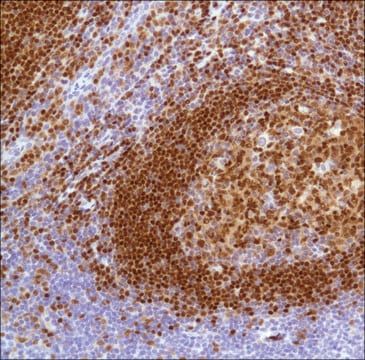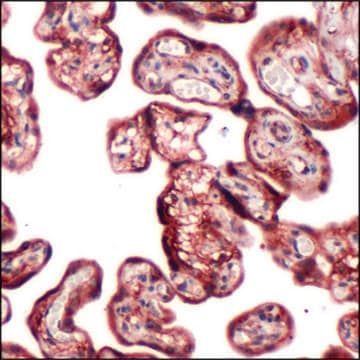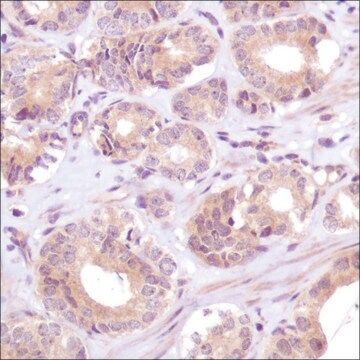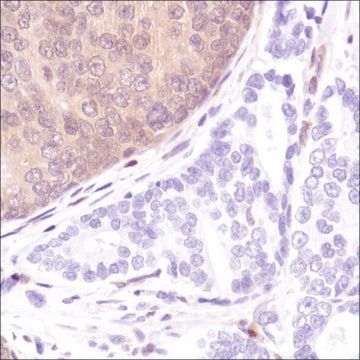SAB5500160
Anti-PAX-5 antibody, Rabbit monoclonal
clone SP34, recombinant, expressed in proprietary host, affinity isolated antibody
Manufacturer: Sigma Aldrich
Select a Size
| Pack Size | SKU | Availability | Price |
|---|---|---|---|
| 100 μL | SAB5500160-100-μL | In Stock | ₹ 37,218.30 |
SAB5500160 - 100 μL
In Stock
Quantity
1
Base Price: ₹ 37,218.30
GST (18%): ₹ 6,699.294
Total Price: ₹ 43,917.594
biological source
rabbit
Quality Level
100
recombinant
expressed in proprietary host
conjugate
unconjugated
antibody form
affinity isolated antibody
antibody product type
primary antibodies
clone
SP34, monoclonal
species reactivity
human (tested)
species reactivity (predicted by homology)
chicken, mouse, dog
technique(s)
flow cytometry: 1:100immunohistochemistry: 1:50
Description
- General description: PAX-5 is a B cell specificactivator protein (BSAP). In the early stages of B cell developmemt, PAX-5 influences the expression of several B-cell-specific genes, such as CD19 and CD20. PAX-5 is expressed primarily inpro-, pre-, and mature B cells, but not in plasma cells. Interestingly, PAX-5 mRNA is transiently detected in the mesencephalon and spinal cord during embryogenesis. Expression then shifts to the fetal liver and correlates with the onset of B lymphopoiesis. This indicates that PAX-5 is important in B cell development, but may also have a role in proper neuronal development.
- Immunogen: Synthetic peptide derived from C-terminus of human PAX-5 protein.
- Features and Benefits: Evaluate our antibodies with complete peace of mind. If the antibody does not perform in your application, we will issue a full credit or replacement antibody. Learn more.
- Physical form: 0.1 ml rabbit monoclonal antibody purified by protein A/G in PBS/1% BSA buffer pH 7.6 with less than 0.1% sodium azide.
- Disclaimer: Unless otherwise stated in our catalog or other company documentation accompanying the product(s), our products are intended for research use only and are not to be used for any other purpose, which includes but is not limited to, unauthorized commercial uses, in vitro diagnostic uses, ex vivo or in vivo therapeutic uses or any type of consumption or application to humans or animals.
SAFETY INFORMATION
WGK
WGK 2
Flash Point(F)
Not applicable
Flash Point(C)
Not applicable
Compare Similar Items
Show Difference
biological source: rabbit
Quality Level: 100
recombinant: expressed in proprietary host
conjugate: unconjugated
antibody form: affinity isolated antibody
antibody product type: primary antibodies
clone: SP34, monoclonal
species reactivity: human (tested)
species reactivity (predicted by homology): chicken, mouse, dog
technique(s): flow cytometry: 1:100immunohistochemistry: 1:50
biological source:
rabbit
Quality Level:
100
recombinant:
expressed in proprietary host
conjugate:
unconjugated
antibody form:
affinity isolated antibody
antibody product type:
primary antibodies
clone:
SP34, monoclonal
species reactivity:
human (tested)
species reactivity (predicted by homology):
chicken, mouse, dog
technique(s):
flow cytometry: 1:100immunohistochemistry: 1:50
biological source: rabbit
Quality Level: 100
recombinant: expressed in proprietary host
conjugate: unconjugated
antibody form: affinity isolated antibody
antibody product type: primary antibodies
clone: SP62, monoclonal
species reactivity: human (tested)
species reactivity (predicted by homology): frog, bovine, rat, mouse
technique(s): flow cytometry: 1:100immunohistochemistry: 1:100
biological source:
rabbit
Quality Level:
100
recombinant:
expressed in proprietary host
conjugate:
unconjugated
antibody form:
affinity isolated antibody
antibody product type:
primary antibodies
clone:
SP62, monoclonal
species reactivity:
human (tested)
species reactivity (predicted by homology):
frog, bovine, rat, mouse
technique(s):
flow cytometry: 1:100immunohistochemistry: 1:100
biological source: rabbit
Quality Level: 100
recombinant: expressed in proprietary host
conjugate: unconjugated
antibody form: affinity isolated antibody
antibody product type: primary antibodies
clone: SP170, monoclonal
species reactivity: human (tested)
species reactivity (predicted by homology): dog, mouse
technique(s): flow cytometry: 1:400immunoblotting: 1:100immunohistochemistry: 1:100
biological source:
rabbit
Quality Level:
100
recombinant:
expressed in proprietary host
conjugate:
unconjugated
antibody form:
affinity isolated antibody
antibody product type:
primary antibodies
clone:
SP170, monoclonal
species reactivity:
human (tested)
species reactivity (predicted by homology):
dog, mouse
technique(s):
flow cytometry: 1:400immunoblotting: 1:100immunohistochemistry: 1:100
biological source: rabbit
Quality Level: 100
recombinant: expressed in proprietary host
conjugate: unconjugated
antibody form: affinity isolated antibody
antibody product type: primary antibodies
clone: SP218, monoclonal
species reactivity: human (tested)
species reactivity (predicted by homology): mouse, dog, frog
technique(s): flow cytometry: 1:200immunoblotting: 1:400immunohistochemistry: 1:200
biological source:
rabbit
Quality Level:
100
recombinant:
expressed in proprietary host
conjugate:
unconjugated
antibody form:
affinity isolated antibody
antibody product type:
primary antibodies
clone:
SP218, monoclonal
species reactivity:
human (tested)
species reactivity (predicted by homology):
mouse, dog, frog
technique(s):
flow cytometry: 1:200immunoblotting: 1:400immunohistochemistry: 1:200



